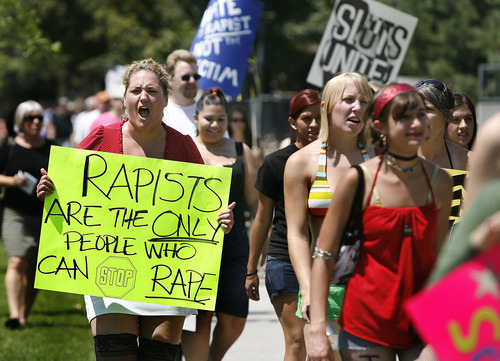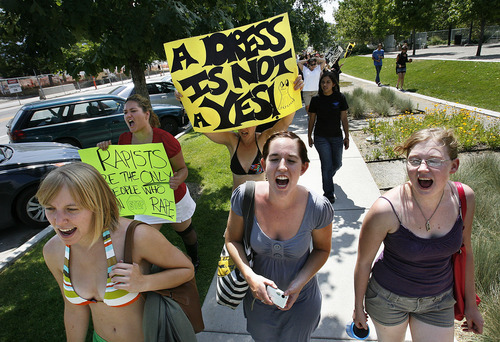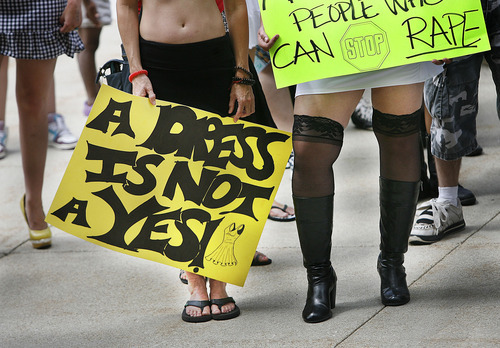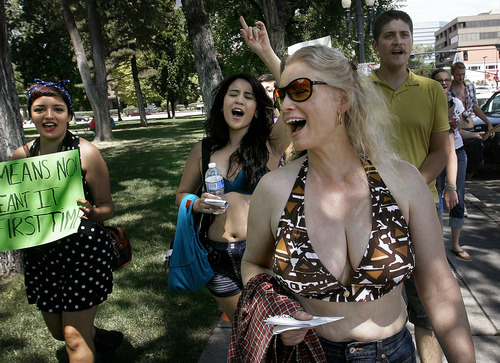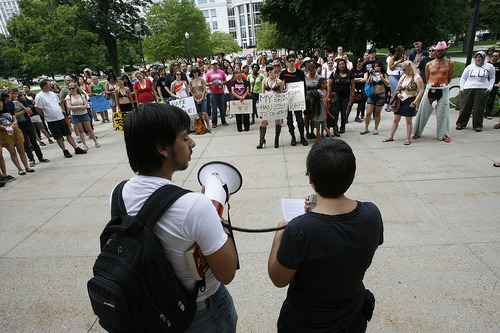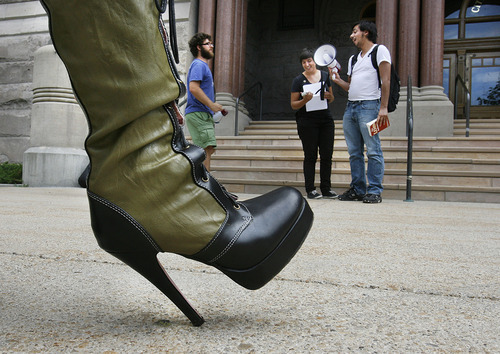This is an archived article that was published on sltrib.com in 2011, and information in the article may be outdated. It is provided only for personal research purposes and may not be reprinted.
SlutWalk, a protest movement prompted by a Canadian police constable's remark that women should watch what they wear lest they be sexually assaulted, spread to Utah on Saturday.
About 200 people alerted by social media marched downtown to condemn sexual violence and affirm that victim-blaming is always wrong, joining with thousands who have held similar viral protests in more than 70 cities in the United States and abroad, including Dallas, Boston and Ottawa, the Canadian capital.
"If a man is wearing a nice fancy watch and goes to the ghetto," Taunya Gren, president of Utah Women in Film, said at the pre-march rally at the Salt Lake City-County Building, "does he deserve to be mugged?"
Many hands, male and female, shot up when Gren asked who among the crowd had been raped or sexually abused.
"Whatever we wear, wherever we go, yes means yes and no means no," the crowd chanted as they walked from the City-County Building past the City Library and back again.
Carrying a sign that said, "Believe it or not, my outfit has nothing to do with you," and "my face is up here" scrawled on her chest, 15-year-old Saige Salazar said she decided to step out for a feminist cause for the first time because women "shouldn't be raped for what they're wearing or look like."
According to BBC News, the widespread marches began this past spring after a Toronto constable at a health and safety talk at a university law school reportedly said, "you know, I think we're beating around the bush here. I've been told I'm not supposed to say this — however, women should avoid dressing like sluts in order not to be victimized."
The constable apologized and was disciplined, but anti-misogyny activists seized the moment to "re-appropriate" the word slut. (Salt Lake City, however, appears to have been ahead of the curve: T-shirts emblazoned with SL,UT have been popular here for years.)
Marci Thorne, 21, of Salt Lake City, said media images of submissive women and dominant men have enabled a rape culture. She marched, she said, to "establish the fact that we control our bodies — it doesn't matter what we wear."
After they did the SlutWalk, Roland Goyette and Janet Chotia, both 38, commented that patriarchy still reigns around the world but U.S. citizens shouldn't assume women are treated better here than in more repressive cultures such as Egypt and the Middle East.
Here, "women are raped in prison," Chotia said. "It comes down to, men should have to control themselves."
Artistically attired in a fitted black T-shirt with the word "betch" printed on the front, fishnet stockings under shorts and pink tennies, Chotia noted that though her outfit might seem sexually powerful, she actually was covered from the neck down.
"I did this on purpose," she said, to show it doesn't matter how she dresses.
Would she wear the outfit in Cairo?
"No!" she said. "Over there they throw rocks."
Or worse. On Feb. 11, CBS war correspondent Lara Logan was sexually assaulted by a mob celebrating the fall of Hosni Mubarak's dictatorship in Cairo's in Tahrir Square. Logan spoke out in May about her brutal attack by men who stripped off her clothes and tried to tear off chunks of her body and scalp. She was saved by a woman dressed in a head-to-toe black religious robes who was joined by other women to form a protective circle around her.
After the attack, many pundits and bloggers, male and female, criticized the blonde newswoman, who was injured in the line of duty, for putting her security team at risk with her attention-getting clothing.
SlutWalk's mission, said activist-organizer Nathan Goodman, is "to spread the word that those who experience sexual assault are not the ones at fault, without exception." Pejorative reclaimed
SLC activists join the SlutWalk movement to cast blame on sexual-assault perpetrators, not victims. Focusing on a Canadian constable's caution to women, thousands have marched in more than 70 cities since last spring.


